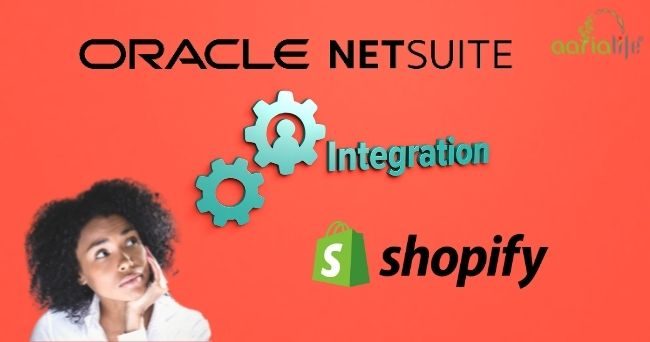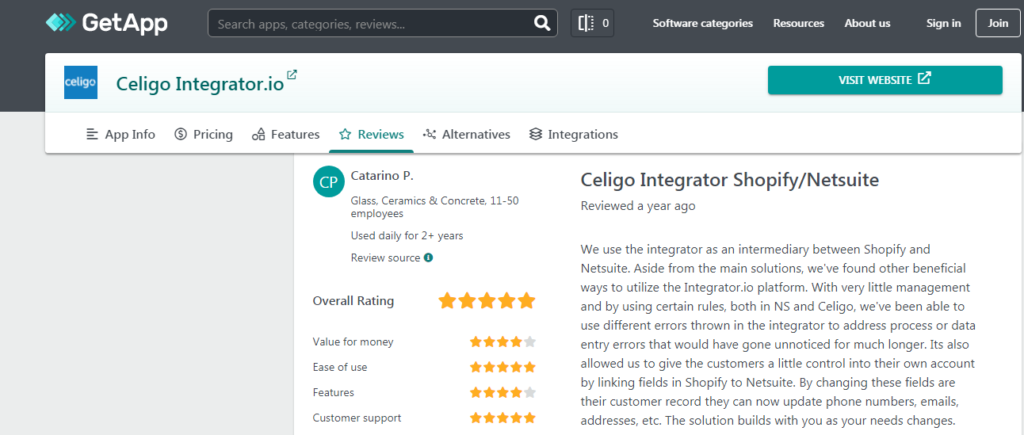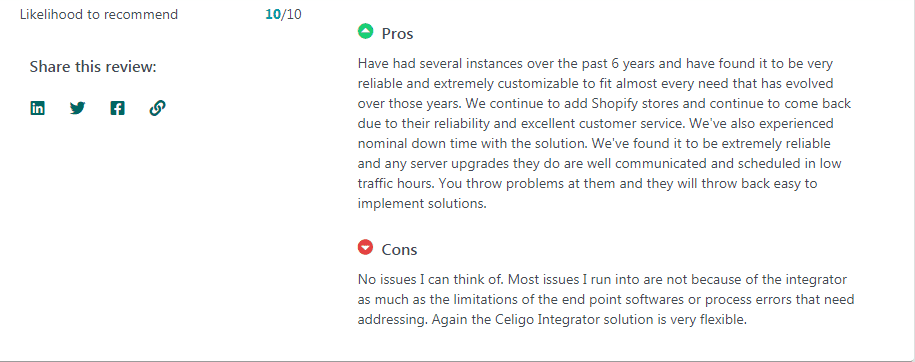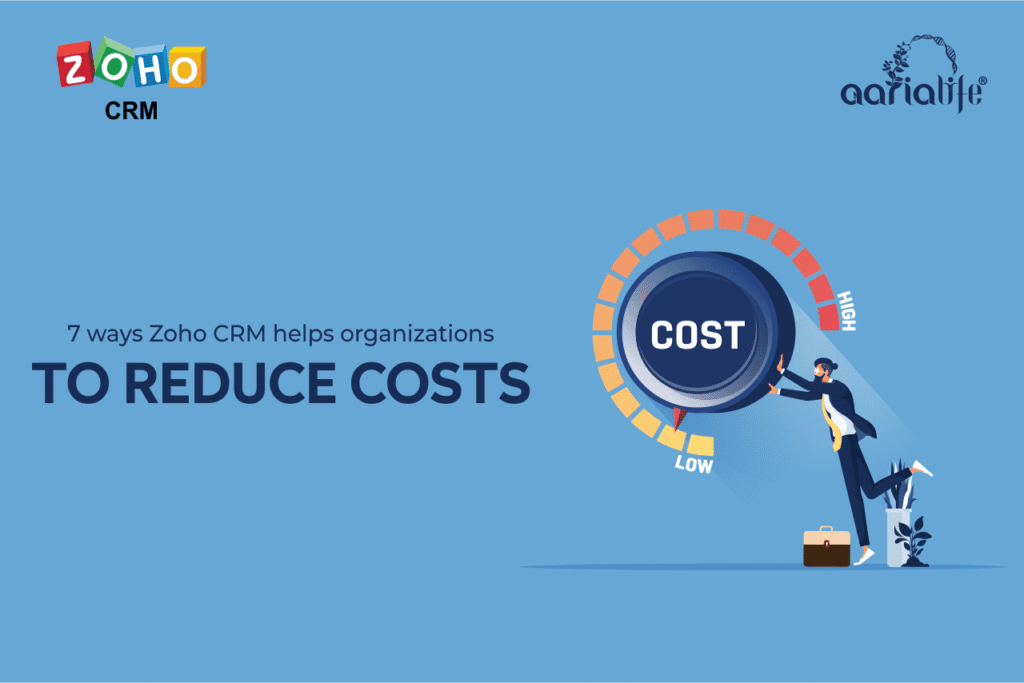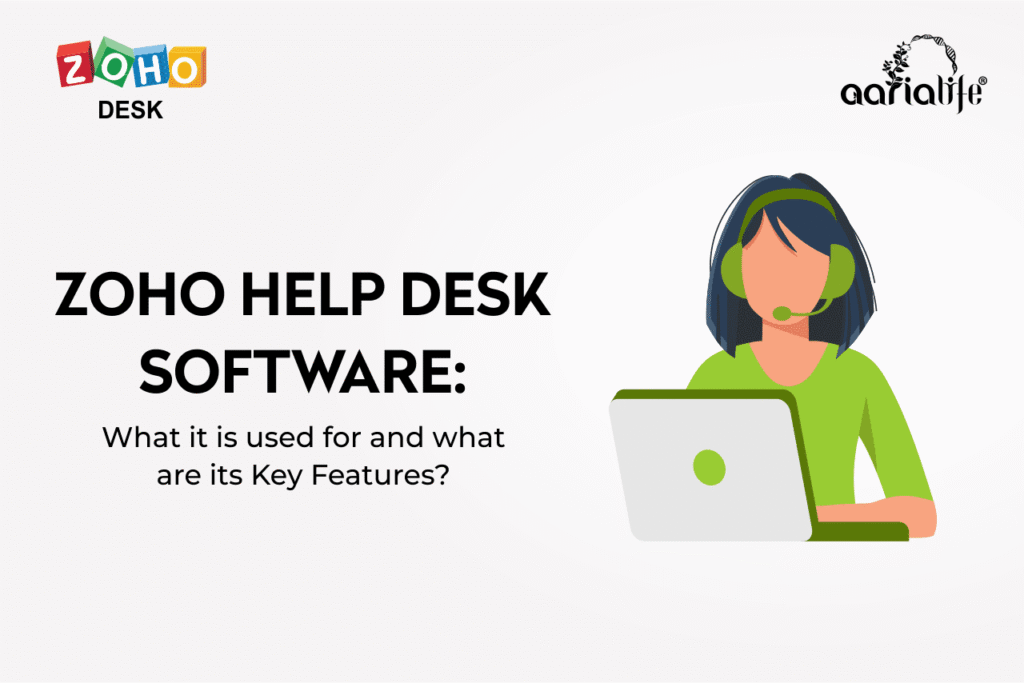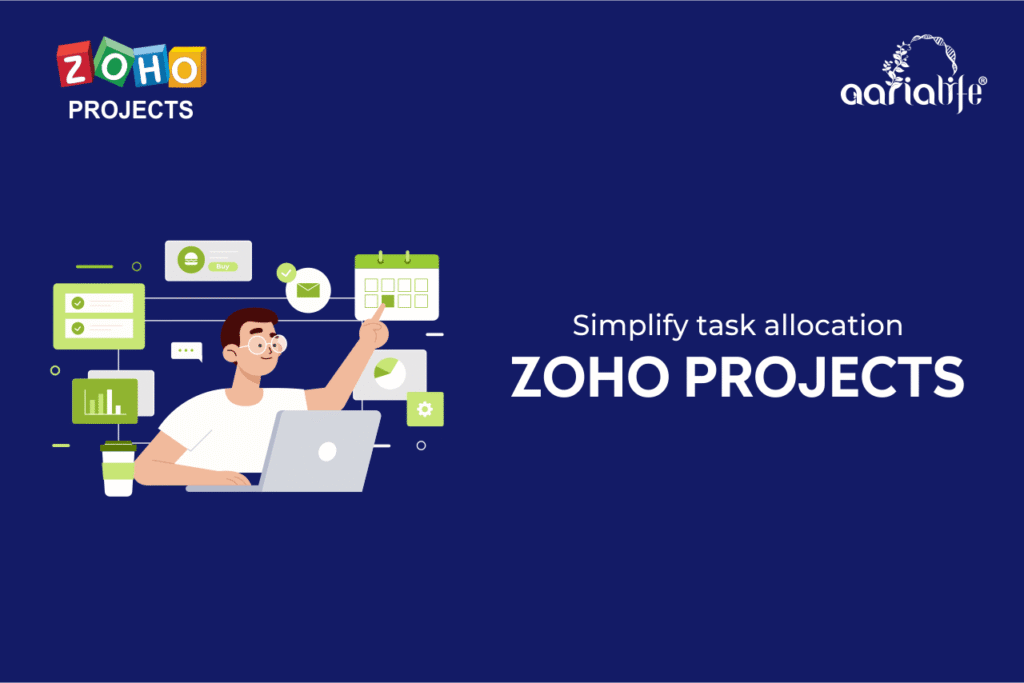Any business that moves forward with siloed, disorganized, and incomplete data will experience slower growth and less customer satisfaction.
Even in the eCommerce industry, data collection and synchronization of disparate systems play an essential part in making informed decisions and nurturing customers.
Having an ERP software solution such as NetSuite amplifies growth opportunities and Shopify is the best eCommerce platform.
NetSuite and Shopify eCommerce data automation would provide better visibility into customer purchasing, inventory management, omnichannel experience, and customer experience than you could ever imagine without the hassle to do manual data entry.
This article discusses the best ways for Oracle NetSuite and Shopify integration to synchronize data between the two systems and also its Pros and Cons.
What Is NetSuite – Shopify Integration?
Integration of business elements enables a standardized customer experience, such as timely delivery, live order tracking, shipping the right products, and more.
These practices will improve the brand’s image in the mind of customers, therefore improving customer retention.
NetSuite Shopify integration helps you to transfer data between the two systems so your eCommerce, warehouse, Supply chain, and accounts team is in sync.
In addition to automating order entry, eCommerce inventory management, accounting, and regulatory compliance, NetSuite ERP integration with Shopify allows your business to speed up your customer returns process.
By not understanding the unique needs of different companies, one risks costly NetSuite integration penalties.
If you decide to integrate NetSuite and Shopify you would need to consider the below factors before you decide on the integration approach:
- Transaction Data volumes
- In-house technical resource availability.
- Your integration Budgets
- Integration touchpoint between Shopify and NetSuite
There are mainly 3 main approaches you can take to integrate NetSuite and Shopify:
1. Custom built integration between NetSuite and Shopify
Businesses are all unique. Furthermore, no two platforms use the same data exchange protocols. Today, businesses prefer to use custom APIs (application programming interfaces) to make integration seamless and efficient because technology is evolving and customization capabilities are increasing.
APIs are available for building customized NetSuite and Shopify integrations.
This allows customers like you to define custom touchpoints between Shopify and NetSuite.
This requires technical expertise to understand and run the integration process.
It is crucial to understand how both the system s exchange data and to manage different scenarios which impact the data exchange.
It is always preferred to use custom integration if you have many scenarios’s in your business process which a standard connector cannot manage.
Pros:
- A custom build integration solution is more flexible and can cover many data exchange scenario’s between NetSuite and Shopify.
- The cost of custom integration is one time.
- There is no subscription fee.
- Custom integration is designed to meet the specific needs of your business.
Cons:
- Any changes in your business process which involve data exchange between NetSuite and Shopify need to be developed separately.
- The integration process takes more time as there is scoping, development, and testing needed for all the scenarios covered in the integration.
- Development partner support is needed in case there are any changes in the API form either NetSuite or Shopify.
2. NetSuite and Shopify Integration using Middleware
There are a lot of companies out there like Celigo and Dell Boomi who have built platforms that allow integration between NetSuite and Shopify using a hub-spoke model.
To link both the systems, these companies offer a cloud-based operational hub (Platform) and act as a middle agent to communicate data. Celigo and Dell Boomi both have NetSuite connector’s which allow rapid deployment of the integration process.
These platforms also support the declaration of all business rules before implementation so, that business owners can define rules for how their data moves between systems and can be more tightly controlled.
This SaaS-based systems, integrates Oracle NetSuite Shopify seamlessly and can scale with your company growth. Customers will get an ‘out of the box’ experience with real-time inventory details, product tracking, and enhanced security.
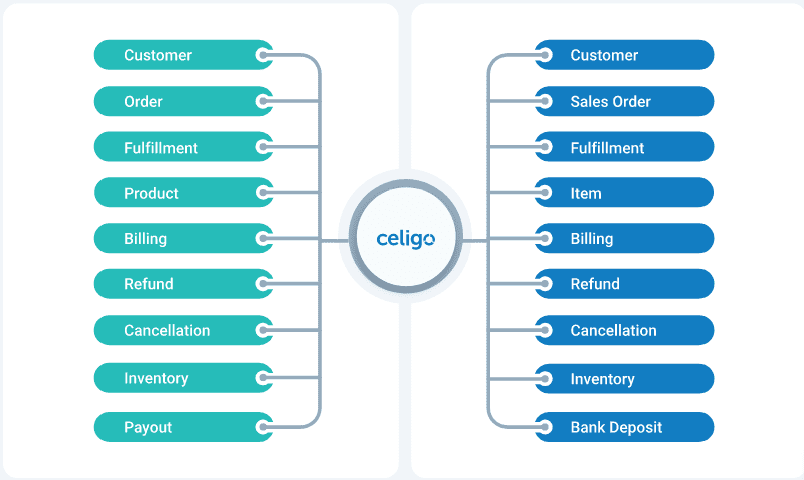
Image- Key integration flow between NetSuite and Shopify using Celigo
Pros:
- A SaaS-based model of integration which can be configured and coded according to business requirements.
- Connectors may be removed or added without having to rebuild your integration, making it easier to add and remove systems.
- These connectors can also be easily customized to meet the needs of any business.
- Less maintenance liability and usually, the vendor is responsible for maintaining the integration API.
- The platform is usually more intuitive to use; you can usually create integrations without any coding. Instead of typing lines of code, you can use a graphical user interface to visually map integrations.
- Integration can be set up and tested within days as opposed to weeks or months.
Cons:
- You have to pay annual or monthly subscription fees, which might be a challenge if you have few integrations.
- Still require technical expertise for non-standard processes.
- As the integration touchpoints grow, it becomes more technical.
- Developers with platform-specific experience are needed and are not easily available.
Integrate using Celigo-
Celigo built NetSuite as its first-ever “Smart Connector”. With more than 20 “ready-to-go” smart connectors, more than 50 templates, and 70 app assistants, Celigo specifically supports NetSuite integration with other systems.
Customer review on Celigo integrator Netsuite/Shopify
Integrate using Dell Boomi-
In a cloud-based integration platform, Dell Boomi seamlessly links on-premises and cloud apps and data.
In essence, it allows companies of all sizes and verticals to integrate data between their key applications without having to acquire or maintain hardware or software.
Users can also create custom cloud-based integration processes and transfer data from on-premises applications to cloud applications using Dell Boomi.
This is why Dell Boomi can be easily integrated with NetSuite. Dell Boomi connects NetSuite to a range of applications including Shopify.
Through the integration of NetSuite account with your Shopify eCommerce, all information regarding your customers, products, Payments, and returns are synchronized between NetSuite (Backend system) and Shopify (Frontend website).
3. NetSuite and Shopify integration using marketplace connectors.
Using marketplace connectors is another approach you can take to connect NetSuite platform with Shopify eCommerce. Both NetSuite and Shopify have their own marketplace where integration vendors list their pre-built connectors.
These are pre-built integrations that can be used out of box for seamless integration by companies willing to connect the two systems.
This approach becomes a perfect solution if you do not have a complex workflow between the systems and want a quick deployment to get your business going.
Generally, pre-built integrations cannot be customized and are redid in nature.
Having said that, these applications are used by many companies and are more stable than custom integrations or platform-based integrations.
Is it easy to integrate NetSuite and Shopify?
Depending on the approach you take for Shopify NetSuite Integration the complexity of the integration may change.
You feel that a standard out-of-the-box connector works for your business, that would be the best way to go around integrating.
But if you have custom scenarios that need to be taken care of, we recommend working with a development partner to understand if custom development is needed or you could use one of the Integration platforms.
At the end of the day, the goal should be to make your business software run the way you need it to be.
Grow and streamline Your Ecommerce with powerful integration
You can drive your integration with Oracle NetSuite eCommerce and Shopify by choosing an experienced NetSuite integration partner- Aarialife Technologies which offers scalable and flexible integration solutions across multiple countries – including India, Canada, and the UAE.
With our technical professionals, you can access years of industry-specific experience and knowledge. Based on the knowledge gained from several successful projects, our expert team will be able to provide the most tailored and effective integration solution to ensure that your data syncs across applications without a glitch.
